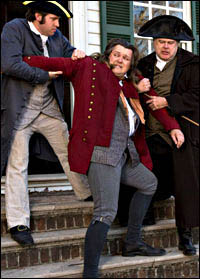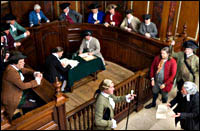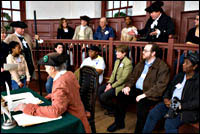All That is Substantial and
Beneficial in a Trial by Jury
by James Breig
Photos by Dave Doody

The short, if several, arms of the law. The possibility of forced removal for trial to England was one of the spurs to revolution. Robert Christian, left, and Steve Holloway flank their legal victim, Bill Rose.
In 1777, Edmund Burke, an Irish-born member of Parliament and supporter of the colonial cause during the Revolutionary War, wrote A Letter to John Farr and John Harris, Esqrs., Sheriffs of the City of Bristol, on the Affairs of America. Burke, who represented Bristol in the House of Commons, began by noting two laws recently enacted by Parliament “with regard to the troubles in America” and which he voted against. By the additions, the legislature had now adopted nine statutes aimed at the rebellious colonies: “It affords no matter for very pleasing reflection to observe that our subjects diminish as our laws increase.”
One of the new acts concerned letters of marque for privateers, and on it Burke said little. The other partially suspended habeas corpus, which protects individuals from illegal imprisonment. Burke said that law denoted “a much deeper malignity” and carried “into execution, purposes which appear to me so contradictory to all the principles, not only of the constitutional policy of Great Britain, but even of that species of hostile justice which no asperity of war wholly extinguishes in the minds of a civilized people.”
The new act classified as pirates Americans who commanded or crewed American warships or privateers, putting fellow Englishmen in a class that could be confined indefinitely “to a future trial and ignominious punishment, whenever circumstances shall make it convenient to execute vengeance on them.”
“The second professed purpose of the act is to detain in England for trial those who shall commit high treason in America,” and it deprived the accused of “all that is substantial and beneficial in a trial by jury”:
A person is brought hither in the dungeon of a ship’s hold; thence he is vomited into a dungeon on land, loaded with irons, unfurnished with money, unsupported by friends, three thousand miles from all means of calling upon or confronting evidence, where no one local circumstance that tends to detect perjury can possibly be judged of; such a person may be executed according to form, but he can never be tried according to justice.
Burke’s denunciation of the law echoed the Declaration of Independence, adopted less than a year earlier in Philadelphia. It also anticipated more than two centuries of debate about principles of criminal justice, about fundamental fairness—what lawyers call substantive due process—issues the United States is still adjudicating.
Most Americans know the opening lines of the Declaration: “When in the course of human events . . .” and “We hold these truths to be self-evident.” But many are not as familiar with its list of grievances against the king, clauses the colonists said justified severing their bonds with Great Britain. They taxed George III for “a history of repeated injuries and usurpations, all having in direct object the establishment of an absolute Tyranny over these States.” Those injuries included such offenses against justice as “depriving us, in many cases, of the benefit of Trial by Jury” and “transporting us beyond Seas to be tried for pretended offences,” to which Burke objected a few months later.
Thomas Jefferson drafted the Declaration as a member of a committee of five chosen by the Second Continental Congress. The other four were Benjamin Franklin of Pennsylvania, John Adams of Massachusetts, Roger Sherman of Rhode Island, and Robert R. Livingston of New York. In an 1823 letter to James Madison, Jefferson said Franklin and Adams made “two or three” alterations, “merely verbal,” and he “turned to neither book nor pamphlet” as he worked. But he did not write in an intellectual vacuum, and he was familiar with the political thought of the time. Jefferson said, “I did not consider it as any part of my charge to invent new ideas altogether, and to offer no sentiment which had ever been expressed before.”
He knew of the declarations, addresses, petitions, and letters that had been issued or adopted by the colonies; had read such philosophers as John Locke and David Hume; and listened to congressional debates. For example, in 1774, Congress had considered a resolution that said “the seizing, or attempting to seize, any person in America, in order to transport such person beyond the sea, for trial of offences, committed within the body of a county in America . . . ought to meet with resistance and reprisal.”
That year, a letter to the people of Great Britain and Ireland was drafted, probably by John Jay, which said in part that Parliament was “depriving the american Subjects of the invaluable Trial by Jury” and taking colonists “in chains 3000 miles from their native country without evidence or Assistance of friends to be tried by a Jury of strangers.” Jefferson was familiar with the Virginia Declaration of Rights, penned by George Mason and adopted in Williamsburg on June 12, 1776. Its sixteen clauses included: “That in all capital or criminal prosecutions a man has a right . . . to a speedy trial by an impartial jury of twelve men of his vicinage.” “Vicinage,” like the word “vicinity,” is taken from Old French and meant “a neighborhood.” Today, in the law, it means a court’s district or circuit.

A felony trial in British Virginia took place in the General Court of Williamsburg’s Capitol, the governor usually presiding, with the Governor’s Council sitting in judgment. In front of the railing, left to right, witness Ken Treese, defendant Bill Rose, bailiff Steve Holloway, and prosecutor Jack Flintom. At the green desk, Ben Knecht, left, and Mark Couvillon. Seated clockwise In the back, from lower left, Russ Wells, Alex Clark, Phil Shultz, Frank Megargee, Chris Allen, governor Scott Green, Robin Reed, Mike Pfeiffer, Joe Musika, John Needre, and Ken Zeller.
Jefferson could draw, as well, on what he’d already composed. In 1774, he had written A Summary View of the Rights of British America in support of instructions he proposed the Virginia General Assembly give to its delegation to the First Continental Congress. Among the abuses it discussed was an act of Parliament by which a murder committed in Massachusetts is,
if the governor pleases, to be tried in . . . the island of Great Britain. . . . The witnesses, too . . . are to . . . appear at the trial. . . . Who does his majesty think can be prevailed on to cross the Atlantic for the sole purpose of bearing evidence to a fact? . . . And the wretched criminal, if he happen to have offended on the American side, stripped of his privilege of trial by peers of his vicinage, removed from the place where alone full evidence could be obtained, without money, without counsel, without friends, without exculpatory proof, is tried before judges predetermined to condemn.
Shortening that to “transporting us beyond seas, to be tried for pretended offences,” Jefferson contributed the point to the Virginia Constitution, adopted June 29, 1776.
In American Scripture, a book on the creation of the Declaration, Pauline Maier writes that there were “at least ninety documents . . . written for a variety of related purposes” reflected in the ideas and style of Jefferson’s composition. In turn, those documents echoed principles espoused in writings that reached back to the Magna Carta of 1215. In April 1776, for instance, jurist William Henry Drayton of South Carolina told a grand jury that “evil machinations tending to nothing less than absolute tyranny” meant “trials by jury discontinued, and juries . . . arbitrarily dismissed without being impaneled,” actions “in contempt of” the Magna Carta.
One of the descendants of the Magna Carta appeared in 1689, the Declaration of Rights, adopted in England to end the reign of James II. Maier, a historian at the Massachusetts Institute of Technology, calls the Declaration of Rights “a sacred text” for American colonists because it contained “fundamental political and legal truths.” It also had a thirteen-clause bill of particulars against James II that anticipated the Declaration of Independence’s claims against George III.
Americans wrote into the federal Constitution’s Bill of Rights ideas about justice—and those fundamental political and legal truths—that they had accumulated by the eighteenth century. Among them are freedom from unreasonable searches and seizures, the protections of the grand jury, a ban on double jeopardy, a right against self-incrimination, a guarantee of due process, a right to a speedy and public trial by an impartial jury from the neighborhood of the crime, a right to know the charges and to confront witnesses, subpoena power, and a guarantee of the right to assistance of counsel.
It was left to the courts to decide what those provisions meant and, in the twentieth century, to begin to require that they be enforced by the states. What is meant by reasonable search and seizure, and by right to counsel, and whether their denial justifies the exclusion of evidence or testimony, are among the questions judges are still trying to settle.
Unquestionably, however, Jefferson charged the king with more than he could be convicted.
Were the charges against George III theoretical, or were they statements of what was happening? Richard Brown, a University of Connecticut historian, says, “The Massachusetts Government Act stated that Americans could be transported to England for trial. But I don’t know that anybody was. In 1775, troops had orders to arrest John Hancock and John Adams, and transport them to England; but they were never arrested.”

From the Magna Carta to the Bill of Rights to the present, the right of the accused to a jury trial has been a keystone of democratic societies. At the Courthouse of 1770 in the Historic Area, from left, Antoinette Brennan, Joy Ingram, Clayton Williams, Don Kline, Gina DeAngelis, Erica Mueller, John Needre, Taysha Lindsay, Bill Chronis, Robyn Eoff, Kymberly Thomas, David Bianco, Tom Hay, Ywone Edwards-Ingram, and Audrey DeAngelis.
Peter Hoffer, a research professor at the University of Georgia, links the charges to “parliamentary acts passed in response to the Boston Tea Party,” which “provided for trials for smugglers in admiralty courts (hence no juries) and moved these courts out of Boston to Halifax. I do not know of any Americans brought to England for trial for treason.”
The reason for moving admiralty courts to Canada, he said, was that juries in Massachusetts refused to convict Americans for acts against the crown and its colonial officials. Francis Bernard, the governor of Massachusetts, said that, in such cases, juries “were not to be trusted.” No one, he said, “will take upon him to declare, that at this time an American jury is impartial and indifferent enough.” That raises a question: Which party to the dispute was acting contrary to the cause of justice? Was it the colonial jury that denied a fair trial to the crown? Or was it the crown, which sought to deny a verdict rendered by the peers of the accused?
Maier writes that trial by jury was also threatened by an act of 1772,
“For the better securing and preserving His Majesty’s Dock Yards, Magazines, Ships, Ammunition and Stores,” and the Administration of Justice Act of 1774, under which colonial offenders could be tried in England. . . . Even the most assiduous of efforts have, however, identified no colonists . . . who were actually transported “beyond seas to be tried for pretended offenses.”
But Stanford University historian Jack Rakove says it doesn’t matter if the charges reflected events. A jury trial by one’s peers “was regarded as a ‘palladium of liberty’ and one of the great rights, so any assault on it would seem ominous, whether executed or not.”
About 230 years after the Declaration was signed, some aspects of juryless trials and transportation beyond seas are being revisited. During the war in Afghanistan, the United States, on the president’s orders, flew enemy combatants, at least one of whom was an American citizen, to Guantanamo Bay, Cuba, as well as the United States, and put them in military jails to await trials by military commissions—tribunals empowered to hear in secret evidence and testimony to which the accused can be denied access. Historians and others, however, point out differences between the Revolutionary War and the war on terror.
Ronald Hamowy, a fellow in social thought at the Cato Institute, says, “It strikes me as clear that we must draw a distinction between combatants of different nations and those who claim to be subjects of the same monarch, as was the case in 1776.” Historian Brown says the problem of “drawing this easy analogy with Guantanamo” is that eighteenth-century Americans considered themselves equal to citizens living in Great Britain. “POWs and foreign combatants aren’t entitled to all the rights of Americans.”
At this writing, defense attorneys and government lawyers are arguing cases through the federal court system in hopes that the United States Supreme Court will settle not only the fine points but the fundamentals of due process. The high court, to quote an abstract of its opinion in one Guantanamo challenge, concluded “due process demands that a citizen held in the United States as an enemy combatant be given a meaningful opportunity to contest the factual basis for that detention before a neutral decisionmaker.”
Georgetown University law professor Neal Katyal, commenting on another decision, said the court was telling the president “that we should return to our foundational ideals, that no one person, no matter how wise he is, can control the fate of our government and depart from our most fundamental values.”
If the issues are not always apposite, there are echoes. The cases show that what some take to be the curtailments of fundamental fairness by an overreaching executive—the sorts of things that troubled Burke, Jefferson, Jay, and others in the 1770s—are still subjects of contention in America’s struggles for justice.
Katyal says, “I think the founders anticipated that presidents are going to push their power. But what is great about America, it seems to me, is that we have a court system that checks the president and allows this guy . . . let’s him sue the world’s highest, most powerful official, the president of the United States, and say, ‘You are doing something illegal to me; you are violating your own basic laws.’ What other nation on Earth allows people to do that? It’s a great thing about America.”
James Breig is an Albany, New York, based writer who contributed to the winter journal an article about the Northwest Passage.
Suggestions for further reading:

